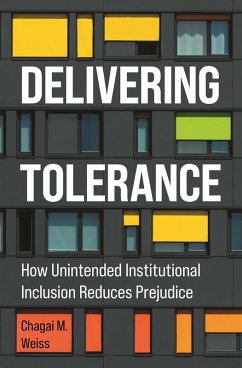A new theory of prejudice reduction, supported by rigorous evidence, arguing that public institutions and the people within them can improve intergroup relations in conflict-ridden societies Decades of social science research focuses on reducing prejudice, which is considered an impediment to intergroup cooperation. Reducing prejudice is notoriously challenging, however, because it is durable and because it motivates avoidance of experiences that would improve intergroup relations. In Delivering Tolerance, Chagai Weiss develops a theory of prejudice reduction through public institutions. Weiss argues that instrumental, and often unintended, minority inclusion in public institutions that provide essential services-including schools, hospitals, and police forces-can facilitate various forms of exposure to out-group service providers that reduces prejudice at scale. Overcoming the challenges of both durability and avoidance, such exposure is especially persuasive in shifting attitudes toward minorities. To test his theory, Weiss examines what is perhaps the most extreme, prominent, and intractable example of group conflict-the relationship of Israelis and Palestinian citizens of Israel (PCI). He finds that Israelis' brief yet meaningful interactions with PCI doctors reduce prejudice, and that information about the rate of PCI inclusion in Israeli healthcare institutions reduces intergroup animosity. He also shows that patterns of prejudice reduction generalize beyond the Israeli case of healthcare institutions, examining other institutional domains and examples of inclusion dynamics in the United States and Germany. Reducing prejudice is discouragingly difficult, but Weiss's account reveals how institutions and the people within them can improve intergroup relations in conflict-ridden societies.
Dieser Download kann aus rechtlichen Gründen nur mit Rechnungsadresse in A, D ausgeliefert werden.









